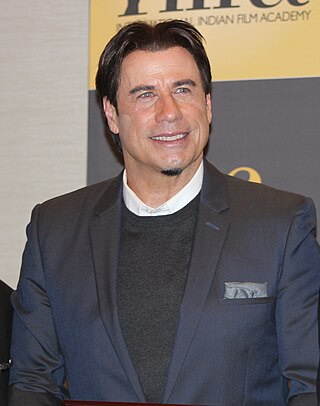
John Joseph Travolta is an American actor. Travolta began acting in television before transitioning into a leading man in films. His accolades include a Primetime Emmy Award and a Golden Globe Award, in addition to nominations for two Academy Awards and a BAFTA Award.

Grease is a 1978 American musical romantic comedy film directed by Randal Kleiser from a screenplay by Bronté Woodard and an adaptation by co-producer Allan Carr, based on the stage musical of the same name by Jim Jacobs and Warren Casey. The film depicts the lives of greaser Danny Zuko and Australian transfer student Sandy Olsson, who develop an attraction for each other during a summer romance.

Face/Off is a 1997 American science-fiction action thriller film directed by John Woo, from a screenplay by Mike Werb and Michael Colleary. It stars John Travolta and Nicolas Cage as an FBI agent and a terrorist, respectively, who undergo an experimental surgery to swap their faces and, in the process, their identities.
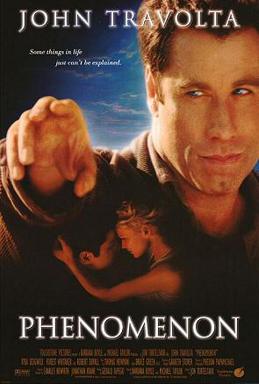
Phenomenon is a 1996 American romantic fantasy drama film directed by Jon Turteltaub, written by Gerald Di Pego, in which an amiable, small-town everyman is inexplicably transformed into a genius with telekinetic powers. It stars John Travolta, Kyra Sedgwick, Forest Whitaker, Robert Duvall, and Jeffrey DeMunn. The original music score was composed by Thomas Newman.
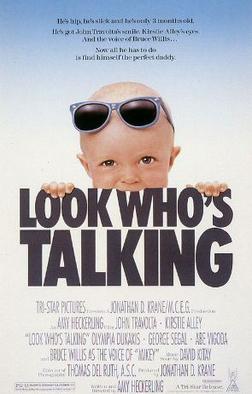
Look Who's Talking is a 1989 American romantic comedy film written and directed by Amy Heckerling, and starring John Travolta and Kirstie Alley. The film concerns the relationship between single mother Mollie (Alley) and her infant son Mikey's babysitter, James (Travolta). Bruce Willis provides the voice of Mikey's precocious thoughts, heard only by the audience. The film also features Olympia Dukakis, George Segal and Abe Vigoda in supporting roles. Produced by M.C.E.G. Productions, Inc. and released on October 13, 1989 by Tri-Star Pictures, the film received mixed reviews from critics. Nevertheless, it was a box office success, grossing $297 million worldwide on its budget of $7.5 million.

Bubble Boy is a 2001 American black comedy film directed by Blair Hayes, starring Jake Gyllenhaal in the title role. It was inspired by the 1976 movie The Boy in the Plastic Bubble. A musical by the same name was written by the same authors and first performed in 2008.

Mickey Blue Eyes is a 1999 American romantic comedy crime film directed by Kelly Makin. Hugh Grant stars as Michael Felgate, an English auctioneer living in New York City who becomes entangled in his soon-to-be father-in-law's mafia connections. Several of the minor roles are played by actors later featured in The Sopranos.

David Phillip Vetter was an American boy with severe combined immunodeficiency (SCID), a hereditary disease which dramatically weakens the immune system. Individuals born with SCID are abnormally susceptible to infections, and exposure to typically innocuous pathogens can be fatal. Vetter was referred to as "David, the bubble boy" by the media, as a reference to the complex containment system used as part of the management of his SCID. Vetter's surname was not revealed to the general public until 10 years after his death in order to preserve his family's privacy.

Urban Cowboy is a 1980 American romantic Western film directed by James Bridges. The plot concerns the love-hate relationship between Buford "Bud" Davis and Sissy. The film's success was credited for spurring a mainstream revival of country music. Much of the action revolves around activities at Gilley's Club, a football-field-sized honky tonk in Pasadena, Texas.

Diana Hyland was an American stage, film, and television actress.
Theodore David DeVita was an American boy with severe aplastic anemia requiring him to live in a sterile hospital room for the last eight years of his life.
Glynnis O'Connor is an American actress of television, film, radio, and theater. She first gained wide attention in the mid-1970s with leading roles in the television version of Our Town and in the short-lived series Sons and Daughters. She also co-starred with Robby Benson in the films Jeremy in 1973 and Ode to Billy Joe in 1976, as well as with Jan-Michael Vincent in the film Baby Blue Marine in 1976.

Perfect is a 1985 American romantic drama film directed by James Bridges and distributed by Columbia Pictures. It was written by Aaron Latham and James Bridges and is based on a series of articles that appeared in Rolling Stone magazine in the late 1970s, chronicling the popularity of Los Angeles health clubs among single people. Its story follows journalist Adam Lawrence, who is assigned to interview a successful entrepreneur accused of dealing drugs. He is then assigned to cover a second story and decides to do an exposé on fitness clubs, where he meets an aerobics instructor named Jessie Wilson, who does not have a great deal of trust in journalists. It stars John Travolta, Jamie Lee Curtis, Anne De Salvo, Marilu Henner, Laraine Newman, Matthew Reed, and Jann Wenner.
Kelly Ward is an American actor and voice director for television animation. He is most famous for his role as T-Bird Putzie in Grease (1978).
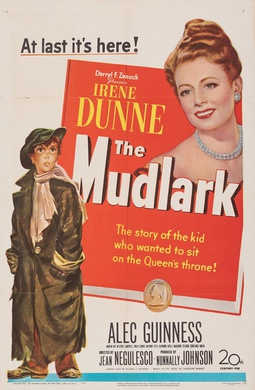
The Mudlark is a 1950 film made in Britain by 20th Century Fox. It is a fictional account of how Queen Victoria was eventually brought out of her mourning for her dead husband, Prince Albert. It was directed by Jean Negulesco, written and produced by Nunnally Johnson and based on the 1949 novel of the same name by American artillery sergeant and San Francisco newspaperman Theodore Bonnet (1908–1983). It stars Irene Dunne, Alec Guinness and Andrew Ray.

Tom et Lola is a 1990 French drama film directed by Bertrand Arthuys. The film is about two children with damaged immune systems who live in sealed plastic bubbles and try to escape. The film was written by Arthuys, Christian de Chalonge, and Muriel Teodori.

Bolt is a fictional character that appears in Walt Disney Animation Studios' animated film Bolt (2008). He is depicted as a White Shepherd with superpowers such as a "super bark" and the ability to shoot lasers from his eyes. When he found himself lost, Bolt discovered that he was an actor in a television show, and must take it upon himself to get back home, learning how to be a normal dog in the process. Bolt's journey and personal evolution as a character are core to the film's main themes.

Boy Pick-Up: The Movie is a 2012 Filipino comedy film starring Ogie Alcasid, Solenn Heussaff, and Dennis Trillo. The film was directed by Dominic Zapata and released by GMA Pictures & Regal Entertainment.
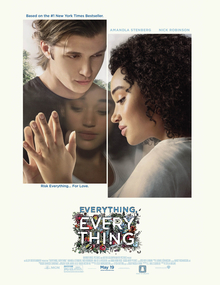
Everything, Everything is a 2017 American romantic drama film directed by Stella Meghie and written by J. Mills Goodloe, based on Nicola Yoon’s 2015 novel of the same name. The film was produced by Elysa Dutton and Leslie Morgenstein and stars Amandla Stenberg and Nick Robinson and follows a young woman named Maddy Whittier (Stenberg) who has a serious medical condition that prevents her from leaving her home, and her neighbor, Olly Bright (Robinson), who wants to help her experience life and they begin falling in love.
The Boy In The Bubble is a children's novel written by Ian Strachan and published in 1993. The novel follows the story of Adam, a child born with severe combined immunodeficiency (SCID), and lived his life in an oxygen tent to prevent him from falling ill, and a schoolgirl named Anne who chooses to base her school project on Adam. The novel won the Red House Children's Book Award and was the 1994 Lancashire Book of the Year.
















